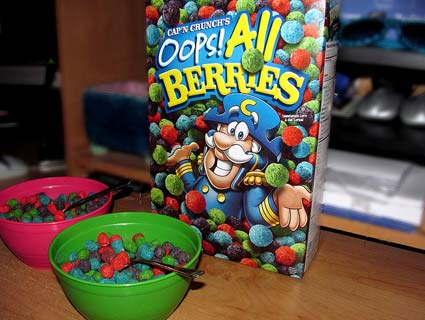
<a href="http://www.flickr.com/photos/zbellink/5359113937/sizes/z/in/photostream/" target="_blank">Alex Bellink</a>/Flickr
If you’ve ever experienced a cupcake coma (you know, the period of extreme lethargy that follows a sugar high brought on by consumption of one or more cupcakes), you might not be surprised by some recent findings on the effects of processed sweeteners. A team of UCLA researchers has observed that high-fructose corn syrup (HFCS) makes rats more forgetful, while omega-3 fatty acids—chemical compounds that research has shown can protect the brain’s synapses—seem to have the opposite effect.
The researchers, whose paper will be published this week in the peer-reviewed Journal of Physiology, trained a group of rats to navigate a maze. Then, they randomly divided the rats into four groups, and for six weeks they fed each group a slightly different diet in addition to the usual rat chow: One group received HFCS in its water; another received omega-3 fatty acids. A third received both HFCS and omega-3s, and the fourth, a control group, received plain old rat chow.
At the end of the six weeks, the group that had been given omega-3 fatty acids but no HFCS was the speediest at remembering how to get out of the maze. The control group (no HFCS or omega-3s) was the second fastest, and the group that had received omega-3 fatty acids and HFCS came in third. The slowpokes of the lot were the group that had only received HFCS. The takeaway: HFCS seemed to impair rats’ memory, while omega-3 fatty acids seemed to help it.
In addition to the memory effects, the researchers also noticed changes in the rats’ metabolism. The groups that had been fed HFCS showed signs of insulin resistance, a condition that has been linked to diabetes and obesity.
So can you up your recall skills by cutting HFCS out of your diet? Hard to say, since a controlled rat study doesn’t exactly count as proof that too much sweet stuff makes humans forgetful. But it’s certainly something that merits more scrutiny: The study’s lead researcher, biology professor Fernando Gomez-Pinilla, believes that insulin could affect the brain as well as the metabolic system. “Insulin is important in the body for controlling blood sugar, but it may play a different role in the brain, where insulin appears to disturb memory and learning,” said Gomes-Pinilla in a press release. “Our study shows that a high-fructose diet harms the brain as well as the body. This is something new.”















